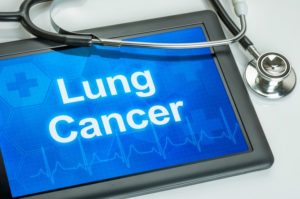Non-small cell lung cancer (NSCLC) and small cell lung cancer (SCLC) are the two major types of lung cancer. About 80 to 85% of diagnosed cases of the disease are attributed to NSCLC and the remaining 10 to 15% to SCLC.
Once diagnosed, a doctor will try to determine how much cancer has spread; this process is known as staging. Different stages of each disease describe how much cancer is in the body and can help doctors to decide on suitable treatment options.
 The staging system most commonly used for NSCLC is the American Joint Committee on Cancer (AJCC) TNM system. There are four stages which include:
The staging system most commonly used for NSCLC is the American Joint Committee on Cancer (AJCC) TNM system. There are four stages which include:
Stage 1- Cancer is found only in the lungs and has not spread to lymph nodes.
Stage 2 – Cancer is found in the lungs and surrounding lymph nodes.
Stage 3- Cancer is found in the lungs, lymph nodes, and in the middle of the chest.
Stage 4- Cancer is found in the lungs, fluid in the area around the lungs, as well as other parts of the body and other organs.
The stages of SCLC are based on the results of biopsies, physical exams, imaging tests or any additional form of testing used to determine how far this type of cancer has advanced. Doctors typically use a two-stage system to help them to decide which form of treatment is best. The stages of SCLC are:
Limited Stage- This is when cancer is found in only one side of the chest and in the lymph nodes above the collarbone – on the same side of the chest.
Extensive Stage- This describes when cancer has spread to lungs, the lymph nodes and other parts of the body.
Treatment for each type of lung cancer varies by stage. Typical approaches for NSCLC may include surgery, radiation, immunotherapy or chemotherapy. Radiation or chemotherapy are the most common types of treatment used for patients diagnosed with SCLC.
Pulmonary medicine is the branch of medicine that deals with the causes, diagnosis, prevention and treatment of diseases affecting the lungs. Pulmonary medicine is also sometimes called pulmonology.
The Division of Pulmonary Medicine at Flushing Hospital Medical Center is dedicated to providing outstanding inpatient and outpatient care through the use of certified physicians and modern research. A variety of conditions are treated and diagnosed in the Pulmonary Department including Lung Cancer, Emphysema, COPD and Asthma.
To schedule an appointment with a pulmonologist at Flushing Hospital, please call 718-670-5486.
All content of this newsletter is intended for general information purposes only and is not intended or implied to be a substitute for professional medical advice, diagnosis or treatment. Please consult a medical professional before adopting any of the suggestions on this page. You must never disregard professional medical advice or delay seeking medical treatment based upon any content of this newsletter. PROMPTLY CONSULT YOUR PHYSICIAN OR CALL 911 IF YOU BELIEVE YOU HAVE A MEDICAL EMERGENCY.
